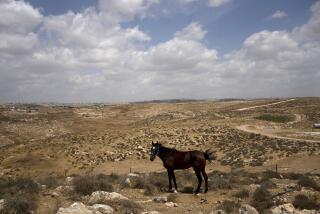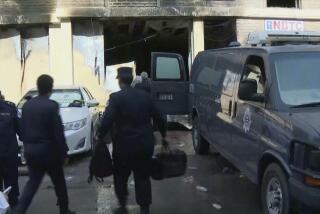Rebuilding Kuwait Is Much Tougher Than U.S. Expected
Mired in problems from the start, the U.S. emergency effort to put Kuwait back on its feet is taking far longer than anticipated and may cost twice as much, U.S. Army officials say.
Col. Ralph V. Locurcio, head of the Army Corps of Engineers unit here, said in an interview this week that it will take the Corps as much as a year to complete its relief work. The Corps’ effort had been expected to last three months and cost the Kuwaiti government about $46 million.
Long supply delays at the border of Saudi Arabia and misunderstandings about what work should be done by whom have plagued the rescue effort, according to Army officials.
“This is a most difficult job,” Locurcio said, “because there’s so much unknown here.”
The slow pace of recovery has dashed the early intentions of many Western business executives who had hoped to cash in quickly on Kuwait’s long-term recovery, a task estimated to cost from $40 billion to $100 billion. Reconstruction is expected to take as long as five years.
“All these companies think that the sky is the limit, and I’m going to tell them it is not,” said Joost Wolfswinkel, acting director of the Netherlands’ Ministry of Economic Affairs. He recently toured the city and spoke with U.S. Army officials.
An erstwhile commercial center of the Middle East, Kuwait City is struggling to regain its balance but has yet to get very far.
There are few signs of life in the downtown shopping area. One day this week, packs of stray cats could be observed roaming amid the omnipresent garbage while two U.S. Army combat medics rummaged through the remains of a TWA ticket office.
“We are just looking for some furniture for our tent,” said Eddie Robinson, 20, of North Carolina.
Even though Iraqi troops left here more than a month ago, commercial activity has barely begun to revive because much of the emirate remains without regular water service, electricity and a viable lending system.
The once-vibrant downtown business district with its gleaming skyscrapers is awash in debris and broken glass, its best hotels in blackened ruins and its once-crowded streets largely devoid of cars and pedestrians.
Merchants can be found sitting idly by outside their looted, gutted businesses, unsure of what to do.
“My whole life gone,” said a Jordanian man, sweeping his hand toward the charred shell of what was once a thriving jewelry kiosk.
Still, a few sprouts of commercial life are emerging, particularly in the areas beyond downtown where Iraqi troops were generally less destructive.
On Friday, for example, along Ahmed Jabar Street, optician Yousef Jannessar for the first time in seven months was reopening the eye wear shop he has operated for 30 years. Jannessar boarded up the shop shortly after the Iraqi invasion last August, hiding his inventory of more than 10,000 pairs of glasses in his home.
The businesses flanking his--a restaurant and a television repair shop--are still boarded shut.
As Jannessar swept up, his first customer drove up--a Kuwaiti needing the ear pieces tightened on a pair of Ray Ban aviator sunglasses. Regretfully, Jannessar couldn’t help. The tiny screwdriver he needed to fix the glasses was at home among the boxes of goods and supplies he had hurriedly packed to keep from the pilferring Iraqis.
“Come back this weekend,” he said, and the man promised to come back Sunday.
“Before war, 1 million people here. Now nobody here,” Jannessar said. “Look on street. You can’t get anybody. Maybe two, three years, business good again.”
A few kilometers up the coast, just off Arabian Gulf Street, pharmacist Fouad H. Awad sat in his darkened store, waiting for his first customer of the day. Awad had reopened Wednesday, doing a brisk business in vitamin tablets and contraceptives.
Though still without electricity--he must leave open the money drawer of his computerized cash register--Awad said he considered himself lucky. While the Syrian restaurant next door was thoroughly gutted, the Iraqis left his tiny Phoenicia Pharmacy untouched.
“Things would be better if we had electricity,” he said. “Maybe it comes tomorrow, Insha Allah”--if God wills it.
Among the greatest impediments to recovery has been the lack of electricity, but that has started to change in recent days as power has begun to come on in selected areas throughout the city.
“We have electricity. It’s wonderful,” Nadrah Al-Rasheed said after power was restored this week to her apartment where she lives with her husband, an accountant and businessman, and two young children.
According to the Corps of Engineer’s Locurcio, it will take another two weeks for full power to be restored, another month before the water system is fixed and as much as two more months before the sanitary system is functioning properly.
Local businessmen say the commercial life in Kuwait won’t begin to reappear in a major way until basic services are repaired and the banks, with government assistance, start making relief loans. Only then, they say, will Kuwait’s extensive and prosperous merchant class, much of which is living abroad, reappear in force.
Most of Kuwait has been without electricity since the final days of the war, when heavy fighting and Iraqi sabotage severely damaged the country’s sophisticated power generating system. There are four electrical power plants around the country. One of the plants, along the coast near downtown, was so badly crippled that it may not be salvageable, experts say. Another plant was spared direct damage, but it has been unable to generate power for customers because its transmission lines have been cut.
At the Doha power plant, west of Kuwait City across Kuwait Bay, Iraqi troops rendered the plant inoperative by blowing up the master control room with two huge charges. More than 6,000 electrical cables were damaged by the blast, said officials of National Power, a British utility company.
Though the master control room remained in shambles, workers did some hasty rewiring to get one of the turbines working. The plant began to regenerate its first electricity last Sunday, exactly one month after the facility was damaged.
According to J. R. Bullock, an engineering manager for National Power, the plant should have most of its turbines operating this summer in time to meet the peak demands of the hot Kuwaiti summer.
Meanwhile, south of here at Kuwait’s Al Zour power plant, the facility was not damaged, but the transmission lines from the plant were cut by deliberate sabotage and by heavy fighting between Iraqi and allied troops.
“The Iraqis tried to hide under the power lines,” said a spokesman for the Corps of Engineers.
The repair of those power lines has been a case study in frustration for one American company, Blount Inc., based in Montgomery, Ala., and a lesson in the sometimes enigmatic business ways of the Middle East.
While Blount’s men and equipment were stalled at the Saudi Arabian border earlier this month, an outfit known as Saudi Cable breezed through the crowded checkpoint and began doing Blount’s work at the Al Zour power plant, several sources said.
Blount eventually got through and is working on repairing transmission lines at the Doha plant.
The Al Zour lines still have not been repaired. Saudi Cable officials could not be reached for comment.
American businessmen are not the only ones who are frustrated. Members of Kuwait’s powerful merchant class are becoming increasingly angry with what they view as their own government’s paralysis in handling the immediate crisis.
Their gripes range from a lack of detail about what kind of government loans they will get to complaints about growing mountains of garbage that, with regular trash pick-ups still not restored, dot neighborhoods throughout the city.
Ibrahim Shaheem is the Kuwaiti government official in charge of the emergency rescue effort, but he has been unavailable for comment because he has been in Saudi Arabia.
The actual work of getting the electricity working and the water running has fallen to the U.S. Army Corps of Engineers, which usually does not get involved in disaster relief outside North America. The Corps is the federal government’s primary arm of construction in disaster relief.
As the extent of the damage has become available, Kuwaiti government officials have asked the Corps to do more and more damage assessment and repair work. Talks are under way on additional work that would roughly double the original $46-million contract, Locurcio said.
“We’ll stay as long as they pay our salaries,” he said.
More to Read
Sign up for Essential California
The most important California stories and recommendations in your inbox every morning.
You may occasionally receive promotional content from the Los Angeles Times.









